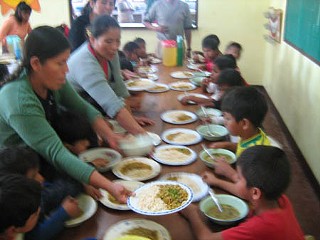Angels on a Mission
By Dan Selinger, Fri., Aug. 31, 2007

The Project Angels of Hope stands near the town of Villa Tunari, in the southern area of the Chapare region of Bolivia. It is a region synonymous with high infant mortality and low education and prospects, and it has been ripped apart by the combination of cocaine production (and its suppression by U.S.-backed eradication programs) and economic stagnation during the past 20 years. Villages in the area consist of shacks made from anything that can be scrambled together – bricks, wood, mud, or plastic. Diet is basic and consists mainly of rice and very little vegetables, in conditions of poor health care and sanitation, meaning extremely low life expectancy (42 years in some areas).
The project employs 20 staff members, including a dentist, a doctor, teachers, cooks, and chefs. It provides a health center for adults and vitamin-rich food, hygiene, and education for 130 children. Pictures posted at the project website show previously malnourished children with bleeding gums and dull eyes replaced by giggling kids with gleaming teeth, bright eyes, and healthy skin. Daniela Santos, head cook in the foundation's well-provided kitchen, speaks proudly of the project's accomplishments. "Before, a lot of children used to die because they were drinking water from the rivers and didn't have any healthy food," she said. "We provide them a mix of vitamins, fruit, cereals, and vegetables. You can see it in them. They have more to them – they're all a little chubby and full of nutrients."
The foundation is almost unanimously supported by the local people. One woman of Santa Elena, Sandra Diaz, said that when her son fell and broke his arm, the staff at the foundation took her child to the hospital in their jeep. "It's a really good service they give. We use it a lot," she said. The foundation also runs a volunteer program, in which travelers from countries as far as Australia, Canada, Israel, and France come along to lend support – building latrines, helping in the kitchen, maintenance, and other projects.
One volunteer, Sabrina Peters of San Francisco, said: "I witnessed firsthand how the project offers vital services such as dentistry, medical care, healthy meals, and schooling to over 130 children in the vicinity. Working in these communities also made me grossly aware of the dire poverty in the region of Chapare and how it affects the children and families."
Got something to say on the subject? Send a letter to the editor.






